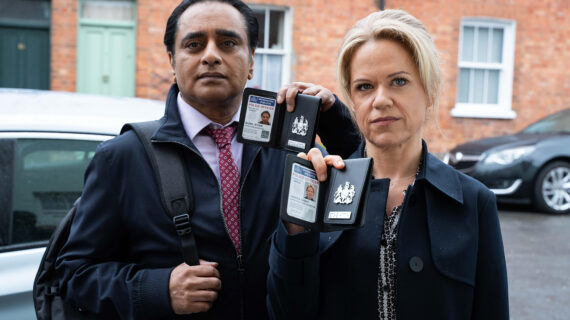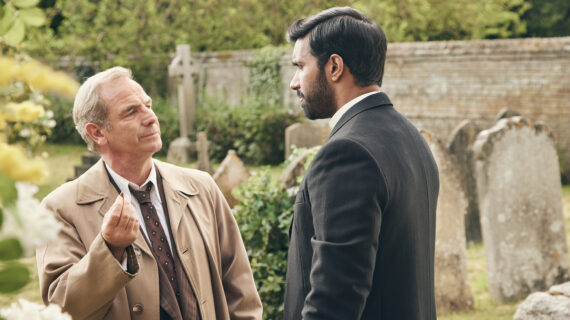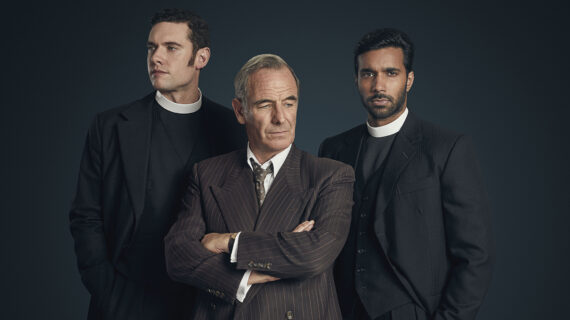Announcer:
The following program is a PBS Wisconsin original production.
Frederica Freyberg:
Now with Roe v. Wade overturned, access to abortion in Wisconsin is suspended. Tonight we explore what happens now and the confusing legal and medical landscape this ruling leaves in its wake. It’s “Here & Now” for July 1.
Announcer:
Funding for “Here & Now” is provided by the Focus Funds for Journalism and Friends of PBS Wisconsin.
Tony Evers:
Today I’m announcing that we’re taking this fight back to the courts. I’ve authorized Attorney General Josh Kaul to file a lawsuit today that is a direct challenge of Wisconsin’s 1849 criminal abortion ban. An overwhelming majority of Wisconsinites supported Roe and making sure abortions remain safe and legal in Wisconsin.
Frederica Freyberg:
I’m Frederica Freyberg. Tonight the ramifications in Wisconsin in the wake of the U.S. Supreme Court decision overturning Roe v. Wade. Because the high court sent it back to the states, Wisconsin now reverts to a statute passed in 1849 that prohibits abortion. But there have been additional and conflicting state abortion laws passed since then. In a moment, we’ll hear from Attorney General Josh Kaul who says the 19th Century ban on abortions is unenforceable because of dueling laws on the books. But first, “Here & Now” reporter Nathan Denzin takes us through the progression of abortion laws in Wisconsin.
Nathan Denzin:
The 1849 law prohibits abortion outright, making it illegal to perform an abortion after a mother feels fetal movement, unless it is to save the mother’s life. Under that law, any person who performs an abortion could be guilty of a felony. As to changes over the years, in 1858 a new law made it a felony to abort at any point after conception. More than 100 years after that, the U.S. Supreme Court ruled in Roe v. Wade. The 1973 case held that the Constitution protected a woman’s right to an abortion prior to the viability of the fetus. Under Roe, the decision to terminate the pregnancy was solely at the discretion of the woman during the first three months. Wisconsin’s post-Roe limits included a law prohibiting abortions after 20 weeks, except for the life or health of the mother. More updates to the state abortion statues continued. A set of laws from 2017 again put restrictions on abortions including a waiting period and mandatory ultrasounds.
Marcher:
Hey, hey. Ho, ho.
Nathan Denzin:
So when the U.S. Supreme Court struck down Roe v. Wade, the decision left both the old and new laws on the books in Wisconsin.
Frederica Freyberg:
That was Nathan Denzin reporting. Having both the old and new laws on the books makes the 1849 law unenforceable. That’s according to Wisconsin Attorney General Josh Kaul. He’s filed a lawsuit seeking to clarify whether the 173-year-old ban is still in place. Josh Kaul joins us now from the Capitol. Thanks very much for being here.
Josh Kaul:
Thanks for having me.
Frederica Freyberg:
Why according to your lawsuit would the 1849 abortion ban be unenforceable?
Josh Kaul:
Well, first I think it’s important just to say where we are, which is you know, we’re a week after Roe v. Wade was overruled and the impact of that is that women in Wisconsin today are less free, less equal, and less safe than they were just a week ago. So we are doing what we can to work to restore access to safe and legal abortion in Wisconsin. Now, our suit argues that the 18 — mid 1800s ban doesn’t come into effect even though it’s still on the books for a couple reasons. One is there were a series of laws that were passed much more recently that are inconsistent with that 19th Century ban. So for example the 19th Century ban doesn’t have an exception even to protect the health of the mother. But the new legislation does have an exception to protect the health of the mother. And it can’t be simultaneously legal and illegal for a doctor to perform an abortion that protects the health of the mother. So to make sure that our statutes continue to have effect, in more recent ones that is, the old one can’t be enforced. Now we also argue that old statute has gone into disuse because it was rarely used before and of course hasn’t been used in the last 50 years.
Frederica Freyberg:
Has this happened before where an earlier law that remains on the books was superseded by a later one?
Josh Kaul:
There is precedent for laws to be impealed — I’m sorry, impliedly repealed. It’s certainly not common but this is not a common situation. We’re in a situation here where the legislature acted with the understanding that abortion was protected. That we have a right that was taken away from Americans after almost 50 years. We’re certainly in uncharted waters here. But you know, that — sorting these issues out so there’s clarity as to what the law is is really critical.
Frederica Freyberg:
Even though there are competing abortion laws on the books, is it as of today illegal? I mean, providers are certainly practicing that way with Planned Parenthood turning away people immediately following last Fridays ruling but is it immediately illegal?
Josh Kaul:
Well, our argument is that it’s not because that old statute is not in effect but providers are, of course — they don’t want to take a chance that what they will be doing could lead to a criminal prosecution. So this suit will help determine exactly what the state of the law is. One of the reasons it’s so important that we go forward with this suit is that Wisconsin providers need to have clarity about what the state of the law is. The best way to get that clarity would be for our legislature to come into session and actually consider legislation on this and hopefully protect reproductive freedom. But absent that, having this litigation will hopefully at least begin the process of providing clarity as we try to think about whether and how a 19th Century law that was in place would apply to 21st Century medicine.
Frederica Freyberg:
Still, could a DA intent on prosecuting a case under the 1849 law do so now?
Josh Kaul:
Well, my office can’t stop them from doing so. They can choose to use their resources however they want. I would discourage them from doing that because Id much rather see them using their limited resources to prosecute serious offenses like homicides or sexual assaults or drug trafficking. But whether they can or not will ultimately depend on what happens with our suit, because if the law can’t be enforced, if we receive that ruling in the suit, then there would be no basis for enforcement. But if the Supreme Court finds that it can be enforced, then it’s up to the DAs whether they do in fact prosecute cases.
Frederica Freyberg:
What’s your sense as to how fast any kind of ruling might be made on this?
Josh Kaul:
I think it’s likely to be a matter of months. You know, this is a legal dispute fundamentally, not a dispute about underlying facts. And so I think a court can rule relatively quickly. But of course, there will be briefing. There will be arguments before the court. And then after the circuit court rules, there’s likely going to be appeals as well. So we’re not going to have clarity immediately. It’s going to take a bit of time. But I do want it to move through the court system as quickly as possible. In the meantime, I have called and continue to call on the legislature to come into session and help provide some clarity here so doctors and nurses and women in Wisconsin have a better understanding, a clearer picture of what the law is.
Frederica Freyberg:
So we should tell our viewers that we did invite Republican legislative leaders to appear tonight. Neither of them responded. But here is what Speaker Vos said about your lawsuit. He said, “It’s sad that Evers and Kaul want to break the law instead of work with the legislature. I’m confident our courts will see through their tactics, he says, and uphold the law.” What is your response to Speaker Vos’ statement?
Josh Kaul:
Well, first, part of the issue here is we have inconsistent laws. And which sets of those laws apply is one of the things we want to solve through the courts. But we are also happy to work with legislative leaders. The governor called the special session and most Republican lawmakers didn’t even show up for that special session. They gaveled in and gaveled out and then just a few days later, we were left in this state of legal uncertainty because Roe was overturned and we still haven’t heard from our legislators. This is a huge development in Wisconsin that’s impacting many people’s lives. And Wisconsinites deserve to have their legislators step up, hear from them on these issues, debate these issues, and I hope ultimately act to protect access to safe and legal abortion.
Frederica Freyberg:
So just briefly, if you worked with the legislature at this point, even after that special session, what would you seek?
Josh Kaul:
Well, I would want them to restore access to safe and legal abortion in Wisconsin. You know, the situation that we had in Wisconsin prior to Roe being overturned was actually a fairly restrictive set of rules. A lot of the laws that are in place were signed by Governor Walker. And returning to that kind of situation, where women who need to obtain abortions are able to get them and are safe doing so. It’s critical to protecting the health and safety of Wisconsin women. We know that when abortion is illegal, it doesn’t stop abortion from happening. What it stops is safe and legal abortion from happening. We’ve got to get back to protecting people’s reproductive freedom.
Frederica Freyberg:
We leave it there. Josh Kaul, attorney general. Thanks very much.
Josh Kaul:
Thanks for having me.
Frederica Freyberg:
Shortly after the high court overturned Roe v. Wade, Governor Evers announced he would grant clemency to anyone charged under the abortion ban and would not appoint state prosecutors who agreed to enforce the law. Our next guest is a sitting district attorney. What will he do? Democrat Tim Gruenke is the DA in La Crosse County. He joins us now and thanks very much for being here.
Tim Gruenke:
Glad to be here.
Frederica Freyberg:
So you have said that you don’t agree with the overturning of Roe v. Wade but would be obliged to prosecute abortion cases under the law. Why?
Tim Gruenke:
I think that in the executive branch, our function is to enforce the laws. And there are many laws that the legislature passes that I might have a disagreement with or I think are unwise or sometimes might be actually more harmful than good. I can prioritize my cases. I can deemphasize some of the laws. We come up with creative solutions like diversion agreements or ordinance violations, but I’ve never said of any law that I would never prosecute a law. I think our job is to enforce laws as prosecutors. So if the law were passed, if the law were held valid by the courts, I have to prosecute it just like any other case. I would look at the facts. I would determine if it’s a good case. I would determine if we could prove it. Would a jury convict and questions like that? But I would never say about any crime that I would never prosecute it or that I would always prosecute it.
Frederica Freyberg:
What do you think about DAs who outright state they will or will not charge certain types of cases like the Dane County DA who pledges not to prosecute abortion cases?
Tim Gruenke:
I understand the sentiment. I also think that women should have the right to control their own bodies and I — Im upset that Roe vs. Wade was overturned, but my personal feelings just don’t play into it. When the legislature passes a law, that’s supposed to reflect the will of the people. As a DA of La Crosse County, Im supposed to represent all people of La Crosse County and not just take my personal views into it. Just like I don’t agree when prosecutors say they won’t enforce gun restrictions because they’re Second Amendment fans or when prosecutors say they won’t enforce certain domestic violence or sexual assault cases because they have a different idea of the law. I think it’s the same thing. I don’t think DAs should be in the business of not prosecuting laws passed by legislature.
Frederica Freyberg:
As a district attorney who would have the discretion to prosecute abortion cases, would you practically, though, right now be able to take a case to court?
Tim Gruenke:
Practically I don’t know that it’s possible right now. In Wisconsin there’s actually two abortion statutes that somewhat conflict with each other. There’s one passed in 1849 and then one in 1985. They have different penalties. They have different exceptions. They have different definitions. So at this point, Im not sure which one the legislature intends us to follow. So it would be difficult for me to try to get a case, figure out which law would apply, and practically go forward and prosecute that case until the courts make a ruling or attorney’s general lawsuit is successful or the legislature pass as law that’s both clearer and reflects the intent of Wisconsin people. I think it would be hard practically to enforce the laws on the books now.
Frederica Freyberg:
So you effectively are with Josh Kaul in saying it’s unenforceable at this time, is that the same thing?
Tim Gruenke:
I think it’s practically enforceable. When the case comes, the facts may be such that it’s different. But at this, I’m not sure how district attorneys are supposed to understand which of two laws are supposed to be enforced when they’re prohibiting the same conduct but different definitions and penalties and seem to have different legislative intent.
Frederica Freyberg:
If the courts as a result of Josh Kauls lawsuit uphold the near complete ban on abortions in Wisconsin, how do those cases even come in you for charging? Who refers them? What does that look like?
Tim Gruenke:
There’s another question that practically Im not sure that that would become an issue because we don’t have the ability to go into doctor’s offices. Healthcare is obviously confidential. We certainly don’t send our investigators to hospitals and even if we did, I don’t think they would gave us any information. So Im not clear on how a case would even come to us. And if it did, Im not sure what information we would be able to gather and so I think it’s practically very different to enforce this ban, even though a lot of people think it’s a change. I’m not sure much is going to change in most counties in Wisconsin.
Frederica Freyberg:
So you are standing by to find some clarity around these laws.
Tim Gruenke:
I would urge the legislature to do what I think a lot of people wanted, when Roe vs. Wade was overturned, was the ballot to the states. And I think they should have that discussion, find out what does Wisconsin really want. Do we want exceptions? Do we want a certain time period? How are we defining health of the mother? Is it physical health? Mental health? Financial health? Emotional health? There’s a lot of things in the statues right now that need to be fixed and I would think the legislature would want to welcome that and have that discussion and give us some clarity on what exactly it is we’re supposed to be prosecuting.
Frederica Freyberg:
Tim Gruenke, DA, La Crosse County, thanks very much.
Tim Gruenke:
Thank you.
Frederica Freyberg:
With the laws in limbo, Wisconsin physicians are contending with what this means for patient care. Marisa Wojcik sat down with Dr. Amy Domeyer, legislative chair of the Wisconsin section of the American College of Obstetricians and Gynecologists.
Marisa Wojcik:
What was your reaction and the reaction of some of your patients when this news came down?
Amy Domeyer:
This is something, because of the draft leak, that we at Wisconsin ACOG have been preparing for. We’ve been having conversations within our state amongst other physician groups trying to anticipate this moment and prepare the best we can to take the best and safest care of our patients, given the current political landscape or the current change in Wisconsin law reflected based on the judicial decision. American College of Ob-Gyns views abortion as healthcare, as essential healthcare for our patients. And so knowing that our colleagues who are caring for patients every day who are needing these services, it’s devastating.
Marisa Wojcik:
So now that the right to access an abortion has been overturned, where does that leave physicians in terms of patient care?
Amy Domeyer:
Yeah. So I would say, number one, we’re following very closely the legal landscape in the state of Wisconsin. I’m sure you’re aware of the lawsuit that was placed yesterday by Governor Evers and Attorney General Kaul. So I think all of us are watching to see how that may impact our ability to care for patients. The conditions in the law include one for an exemption for the life of the mother and — or the life of the pregnant person, rather. And the challenge is that this law, which was written in 1849, before ultrasound, before any of the diagnostic tools that we have today, doesn’t give us clarification of what that means. And so the challenge for us as providers is trying to interpret what the life of the mother means. How sick does a patient have to get before I can provide services that I know are safe and effective? And so I think that and where we are at in terms of our state professional society of ob-gyns as trying to figure out how to best provide the safest care for our patients, so that we aren’t waiting until a patient cannot be pulled back. I think there may be this misconception that, oh, the life of the mother. Well, we can just decide at some point that she’s sick enough and then provide treatment and all is well. Patients that are allowed to get sick enough are in the ICU. They may have to have their uterus removed for lifesaving care. So it isn’t so easy in terms of medical decision making to provide a quick fix once a person has gotten that far — that far ill. And prior to this decision, if it got to that point, it was because a patient chose to be there. It was because the patient felt strong enough about that pregnancy and continuing that they accepted the risk of severe illness or potential death. And now with this law, that won’t be the case.
Marisa Wojcik:
If a situation right now without the law being cleared up, presented itself, that a pregnancy would need to be terminated, is that something that physicians like yourself are going to do if needed for the mother?
Amy Domeyer:
Yeah. I think honestly right now, we’re still sorting that out. So the answer is I hope yes, because of the life of the mother is at risk. I hope any ob/gyn would recognize that and quickly reach out to partners at other hospitals to get approval so that this can move forward so patients’ lives are saved. That said, I would imagine given the criminal penalties for physicians that any doctor in that situation would feel scared. You know, it’s a felony conviction. I got kids at home. I’m doing your pap smear. I’m not a felon. So that’s scary.
Marisa Wojcik:
When the law is cleared up or attempted to be cleared up, are there laws that can capture what it used to be a conversation between a patient and the physician?
Amy Domeyer:
I think in general, as doctors, as ob/gyns, we are very resistant to government intrusion on doctor/patient relationships. So legislating medical care presents a danger in us being able to provide again, the best and safest care for our patients.
Marisa Wojcik:
We’re going leave it there for today. Dr. Domeyer, thank you so much for joining us.
Amy Domeyer:
Thank you so much for having me.
Frederica Freyberg:
You can see the extended version of that interview on our web page.
Planned Parenthood of Wisconsin suspended its abortion services immediately upon the Supreme Court decision overturning Roe v. Wade. The provider has patient navigators to help people find out-of-state options, like those across the border in Illinois, where abortion remains legal. We check in with Julie Uhal of Planned Parenthood of Illinois who manages its ‘securing access for everyone’ program. Thanks so much for being here.
Julie Uhal:
Thank you for having me on today.
Frederica Freyberg:
What kind of influx of women seeking abortions has Planned Parenthood of Illinois seen from bordering states like Wisconsin?
Julie Uhal:
Thanks for asking that. We’ve preparing for this moment for a really long time. And projections have shown that we’re anticipating to see up to 20 to 30,000 additional abortion patients from our neighboring states annually now that Roe has been overturned. It will take a long time to see exact numbers and trends. It’s only been a week. It feels like five years since the decision came down. But I can share that our call volume doubled on Friday and Saturday following that decision, including from Wisconsin patients who like you said may have been at the clinic for an appointment last Friday and were forced to reschedule that and it created a lot of chaos and confusion.
Frederica Freyberg:
Indeed. You’re Securing Access For Everyone or SAFE program. Did you stand this up just for this eventuality or has it been long standing?
Julie Uhal:
It was for this eventuality. We’ve seen the writing on the walls for years now, knowing that you know, far right conservatives have been planning to overturn abortion access in this country. So the program officially started in 2019.
Frederica Freyberg:
So Planned Parenthood has patient navigators to help with out-of-state abortion care. How does that work exactly?
Julie Uhal:
So a patient navigator is kind of like a case manager, kind of like the travel agent and their job is specifically to work with patients who face logistical barriers to access abortion care. And as you can imagine, that’s going to become more complicated and more difficult as they’re forced to travel further. So it depends, patient by patient, what sort of assistance they need. Sometimes it’s just a subsidy. Sometimes it’s hotel. Sometimes it’s travel, childcare, food vouchers, gas voucher. We really try to meet the patient where they are and assist with any of those needs they might be facing.
Frederica Freyberg:
I read that antiabortion groups are drafting model legislation to allow private citizens to sue anyone who helps a resident of a state that bans abortion from terminating a pregnancy out of state. What’s your reaction to that?
Julie Uhal:
Im disappointed but not surprised. I think that they have been testing every outlet they can in order to criminalize folks for accessing that healthcare that they need. But you know, we’re not going to stop and we’re committed to helping people access that care however we can.
Frederica Freyberg:
How is safety ensured for women who might travel from their home states for an abortion procedure?
Julie Uhal:
So I just want to emphasize that abortion is safe and effective. It is certainly safer than pregnancy or childbirth is. The medication abortion pill specifically has a lower rate of adverse side effects than Tylenol does. The reality is any safety concerns come from the very vulnerable situations people will be put in when they’re facing criminalization to cross state lines for healthcare, but we take every step that we can in order to educate our patients about those risks and make sure that their confidentiality and privacy is protected.
Frederica Freyberg:
If someone traveled from Wisconsin to Illinois for example and had their pregnancy terminated, do they stay in place for a period of time to be monitored — you’re saying it’s extremely safe, right. But is there kind of a period of time where they stay in place?
Julie Uhal:
Depending on whether they’re seeking a medication or in clinic abortion, yeah, they will be at the clinic to be monitored for any immediate health concerns associated with that. But otherwise, our centralized follow up program is always reachable by phone or online.
Frederica Freyberg:
So lastly, is your Planned Parenthood hiring clinicians from places like Wisconsin to assist with this influx of patients?
Julie Uhal:
I can’t share any specifics about the operational things we’re working on but I will say that this response to this public health crisis is going to be a marathon, not a sprint. So we’re working really closely with all of our partners around the Midwest region to ensure that patients have access to the care they need no matter where they’re coming from and there will be more to come there.
Frederica Freyberg:
Is it accurate that there’s a Planned Parenthood just across the border in South Beloit, Illinois?
Julie Uhal:
Im not familiar — if there is, it’s not a PPIL clinic. Our clinic that’s closest to the Wisconsin border is in Waukegan.
Frederica Freyberg:
Julie Uhal from Planned Parenthood of Illinois, thanks so much.
Julie Uhal:
Thanks for having me.
Frederica Freyberg:
For more on this and other issues facing Wisconsin, visit our website at PBSwisconsin.org and then click on the news tab. That’s our program for tonight. I’m Frederica Freyberg. Have a good holiday weekend.
Announcer:
Funding for “Here & Now” is provided by the Focus Funds for Journalism and Friends of PBS Wisconsin.
Search Episodes
Related Stories from PBS Wisconsin's Blog

Donate to sign up. Activate and sign in to Passport. It's that easy to help PBS Wisconsin serve your community through media that educates, inspires, and entertains.
Make your membership gift today
Only for new users: Activate Passport using your code or email address
Already a member?
Look up my account
Need some help? Go to FAQ or visit PBS Passport Help
Need help accessing PBS Wisconsin anywhere?

Online Access | Platform & Device Access | Cable or Satellite Access | Over-The-Air Access
Visit Access Guide
Need help accessing PBS Wisconsin anywhere?

Visit Our
Live TV Access Guide
Online AccessPlatform & Device Access
Cable or Satellite Access
Over-The-Air Access
Visit Access Guide
 Passport
Passport

















Follow Us